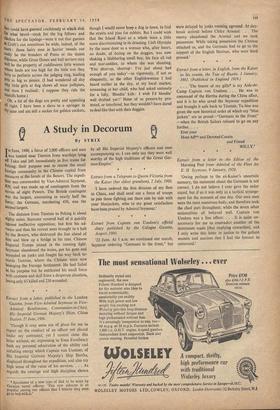A Study in Decorum
By STRIX
IN June, 1900, a force of 2,000 officers and men was landed near Tientsin from warships lying ofi Taku and left immediately in five trains for Peking; their purpose was to rescue the small foreign community in the Chinese capital from massacre at the hands of the Boxers. The expedi- tion was commanded by Vice-Admiral Seymour, RN, and was made up of contingents from the navies of eight Powers. The British contingent Was the largest, amounting to nearly half the force; the German, numbering 450, was the second largest.
The distance from Tientsin to Peking is about eighty miles. Seymour covered half of it quickly against ineffective opposition; but first his ad- vance and then his retreat were brought to a halt by the Boxers, who destroyed the line ahead of him and blew up a bridge in his rear. Chinese Imperial Troops joined in the running fight. Seymour abandoned the trains, put his guns and Wounded on junks and fought his way back to- Wards Tientsin, where the Chinese were now besieging the Foreign Settlement. He had failed in his purpose but he extricated his small force With coolness and skill from a desperate situation, losing only 65 killed and 230 wounded.
* * *
Extract from a letter, published in the London Gazette, from Vice-Admiral Seymour to Vice- Admiral Bendemann, Commander-in-Chief, His Imperial German Majesty's Ships, China Station. 27 June, 1900.
'Though it may seem out of place for me to report on the conduct of an officer not placed tinder my command, yet I cannot close this letter without, sir, expressing to Your Excellency both my personal admiration of the ability and unfailing energy which Captain von Usedom, of His Imperial German Majesty's Ship Hertha, displayed throughout the expedition, and also my high sense of the value of his services. . . . As regards the courage and high discipline shown * Specimens of a new type of dirk to be worn by German naval officers. 'This new sidearm is so Popular among our officers that I believe they even Vito bed with it.' by all His Imperial Majesty's officers and men accompanying us, I can only say they were well worthy of the high traditions of the Great Ger- man Empire.'
* *
Extract from a Telegram to Queen Victoria from the Kaiser (her eldest grandson), 2 July, 1900.
'I have ordered the first division of my fleet to China, and shall send out a force of troops to join those fighting out there side by side with your bluejackets, who to my great satisfaction have been praised by Admiral Seymour.'
* * *
Extract from Captain von Usedotn's official diary published by the Cologne Gazette, August, 1900.
'22 June. At 1 a.m. we continued our march, Seymour ordering "Germans to the front," but were delayed by junks running aground. At day- break arrived before Chiku Arsenal. . . . The enemy abandoned the Arsenal and we took possession. While taking possession the Chinese attacked us, and the Germans had to go to the support of the English Marines, who were hard pressed.'
* *
Extract from a letter, in English, from the Kaiser to his cousin, the Tsar of kussia. 3 January, 1902. (Published in England 1919.) . . . 'The bearer of my gifts* is my Aide-de- Camp Captain von Usedom. . . . He was in command of the Hertha during the China affair, and it is he who saved the Seymour expedition and brought it safe back to Tientsin. To him was given the now historical order of which my "blue jackets" are so proud—"Germans to the Front" —when the British Sailors refused to go on any further. . . .
Ever your Most Affme and Devoted Cousin and Friend WILLY.'
* *
Extract from a letter to the Editor of the Morning Post from Admiral of the Fleet Sir E. H. Seymour, 9 January, 1920.
`Owing perhaps to the ex-Kaiser's uncertain memory, the statement about the Germans is not correct. I do not believe I ever gave the order stated, but if so it was only as a tactical arrange- ment for the moment of one day. Our own men were the most numerous body, and therefore took the chief part throughout; while the seven other nationalities all behaved well. Captain von Usedom was a fine officer. . . . It is quite un- necessary for me to contradict another of the statements made [that implying cowardice], and I only write this letter in justice to the gallant seamen and marines that I had the honour to command.'






























 Previous page
Previous page